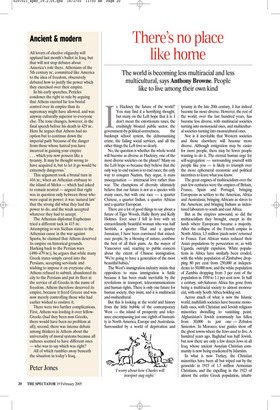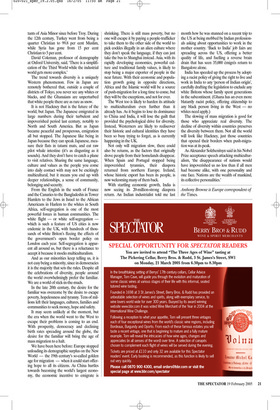There’s no place like home
The world is becoming less multiracial and less multicultural, says Anthony Browne. People like to live among their own kind Is Hackney the future of the world? You may find it a horrifying thought, but many on the Left hope that it is. I don’t mean the extortionate taxes, the crushingly bloated public sector, the government-by-political-correctness, the bankrupt school system, the dehumanising crime, the failing social services, and all the other things the Left love so dearly.
No, the question is whether the whole world will become as diverse as Hackney, one of the most diverse societies on the planet? Many on the Left hope so because they believe that the only way to end racism is to end races; the only way to conquer Nazism, they argue, is mass miscegenation — interracial love rather than war. The champions of diversity ultimately believe that our future is not as a species with many races, but with one race — a quarter Chinese, a quarter Indian, a quarter African and a quarter European.
There are a lot of good things to say about a future of Tiger Woods, Halle Berry and Kelly Holmes. Ever since I fell in love with an extraordinarily beautiful woman who was half Scottish, a quarter Thai and a quarter Jamaican, I have been convinced that mixedrace people, by a blessing of nature, combine the best of all their parts. As the mayor of Vancouver said, reacting to public concern about the extent of Chinese immigration, ‘We’re going to have a generation of the most beautiful babies.’ The West’s immigration industry insists that opposition to mass immigration is futile because it has been made inevitable by the revolutions in transport, telecommunications and human rights. There is only one future for human society, they insist, and it is multiracial and multicultural.
But this is looking at the world and history from the little bubble of the contemporary West — the island of prosperity and tolerance encompassing just one eighth of humanity in North America, Europe and Australasia. Surrounded by a world of deprivation and tyranny in the late 20th century, it has indeed become far more diverse. However, the rest of the world, over the last hundred years, has become less diverse, with multiracial societies turning into monoracial ones, and multicultural societies turning into monocultural ones.
Nor is it inevitable that Western societies and those elsewhere will become more diverse. Although emigration may be easier for more people, there may be fewer people wanting to do it. The eternal human urge for self-segregation — surrounding yourself with people like you — is likely to triumph over the more ephemeral economic and political incentives to leave what you know.
The great engines of multiracialism over the past few centuries were the empires of Britain, France, Spain and Portugal, bringing Europeans as settlers to the Americas, Africa and Australasia; bringing Africans as slaves to the Americas; and bringing Indians as indentured labourers to south and east Africa.
But as the empires unwound, so did the multiracialism they brought, except in the lands where Europeans became a majority. After the collapse of the French empire in North Africa, 1.5 million ‘pieds noirs’ returned to France. East African states reduced their Asian populations by persecution or, as with Uganda, outright expulsion. White populations in Africa have similarly been eroded, with the white population of Zimbabwe dropping 80 per cent from 250,000 at independence to 50,000 now, and the white population of Zambia dropping from 3 per cent of the population in 1950 to 1.1 per cent now. In half a century, sub-Saharan Africa has gone from being a multiracial society to almost monoracial, with only South Africa holding out.
Across much of what is now the Islamic world, multifaith societies have become monofaith ones, with Christian and Jewish religious minorities dwindling to vanishing point. Afghanistan’s Jewish community has fallen from 30,000 to just one — Zebulon Simentov. In Morocco, tour guides show off the ghost towns where the Jews used to live. A hundred years ago, Baghdad was half Jewish, but now there are only a few dozen Jews in all Iraq, whose ancient Assyrian Christian community is now being eradicated by Islamists.
In what is now Turkey, the Christian minorities have been all but wiped out by the genocide in 1915 of 1.5 million Armenian Christians, and the expelling in the 1923 of almost the entire Greek population, inhabi tants of Asia Minor since before Troy. During the 12th century, Turkey went from being a quarter Christian to 99.8 per cent Muslim, while Syria has gone from 15 per cent Christian to 5 per cent.
David Coleman, professor of demography at Oxford University, said, ‘There is a simplification of the Third World while the industrial world gets more complex.’ The trend towards diversity is a uniquely Western phenomenon. Few in Japan are remotely bothered that, outside a couple of districts of Tokyo, you never see any whites or blacks, and the Ghanaians are unperturbed that white people there are as rare as snow.
It is not Hackney that is the future of the world, but Japan. The Japanese emigrated in large numbers during their turbulent and impoverished period last century, notably to North and South America. But as Japan became peaceful and prosperous, emigration all but stopped. The Japanese like being in Japan because they can speak Japanese, measure their flats in tatami mats, and eat raw pilot whale intestine (it’s as disgusting as it sounds). And they don’t have to catch a plane to visit relatives. Sharing the same language, culture and values as the people you come into daily contact with may not be excitingly multicultural, but it means you end up with deeper relationships, a sense of community, belonging and security.
From the English in the south of France and the Canaries to the Bangladeshis in Tower Hamlets to the Jews in Israel to the African Americans in Harlem to the whites in South Africa, self-segregation is one of the most powerful forces in human communities. The white flight — or white self-segregation which is such a feature of US cities is now endemic in the UK, with hundreds of thousands of white Briton’s fleeing the effects of the government’s open border policy on London each year. Self-segregation is apparent all around us, but there is a reluctance to accept it because it mocks multiculturalism.
And as our minorities keep telling us, it is not easy being a minority, since in democracies it is the majority that sets the rules. Despite all the celebrations of diversity, people around the world overwhelmingly prefer the familiar. We are a world of stick-in-the-muds.
In the late 20th century, the desire for the familiar was overcome by the desire to escape poverty, hopelessness and tyranny. Tens of millions left their languages, cultures, families and communities to seek money, hope and safety.
It may seem unlikely at the moment, but the era when the world went to the West to escape their problems is coming to an end. With prosperity, democracy and declining birth rates spreading around the globe, the desire for the familiar will bring the age of mass migration to a halt.
We have been here before: Europe stopped unloading its demographic surplus on the New World — the 19th century’s so-called golden age for migration — when it could start offering hope to all its citizens. As China hurtles towards becoming the world’s largest economy, the economic incentive to emigrate is shrinking. There is still mass poverty, but no one will escape it by paying a people-trafficker to take them to the other side of the world to pick cockles illegally in an alien culture where they don’t speak the language, if they can just take the bus to Shanghai instead. Asia, with its rapidly developing economies, powerful culture and traditional family values, is likely to stop being a major exporter of people in the near future. With their economic and population growth going in opposite directions, Africa and the Islamic world will be a source of push-migration for a long time to come, but they will be the exceptions, and not for ever.
The West too is likely to harden its attitude to multiculturalism even further than it already has. As it begins to lose its dominance to China and India, it will lose the guilt that provided the psychological drive for diversity. Instead, Westerners are likely to rediscover their historic and cultural identities they have been so busy trying to forget, as is currently happening in the UK.
Not only will migration slow, there could also be returns, as the factors that originally drove people from their homelands disappear. When Spain and Portugal stopped being impoverished tyrannies, their diaspora returned from northern Europe. Ireland, whose historic export has been its people, is now welcoming many of them back.
With startling economic growth, India is now seeing its 20-million-strong diaspora return. An Indian industrialist told me last month how he was stunned on a recent trip to the US at being mobbed by Indian professionals asking about opportunities to work in the mother country. ‘Back to India’ job fairs are spreading across the US, offering a better quality of life, and fuelling a reverse brain drain that has seen 35,000 émigrés return to Bangalore alone.
India has speeded up the process by adopting a racist policy of giving the right to live and work in India to any ‘person of Indian origin’, carefully drafting the legislation to exclude any white Britons whose family spent generations in the subcontinent. (Ghana has an even more blatantly racist policy, offering citizenship to any black person living in the West — no whites need apply.) The slowing of mass migration is good for those who appreciate real diversity. The decline of diversity within countries preserves the diversity between them. Not all the world will look like Hackney, just those countries that opened their borders when push-migration was at its peak.
As Alexander Solzhenitsyn said in his Nobel Prize acceptance speech attacking multiculturalism, ‘the disappearance of nations would have impoverished us no less than if all men had become alike, with one personality and one face. Nations are the wealth of mankind, its collective personalities.’


















































 Previous page
Previous page